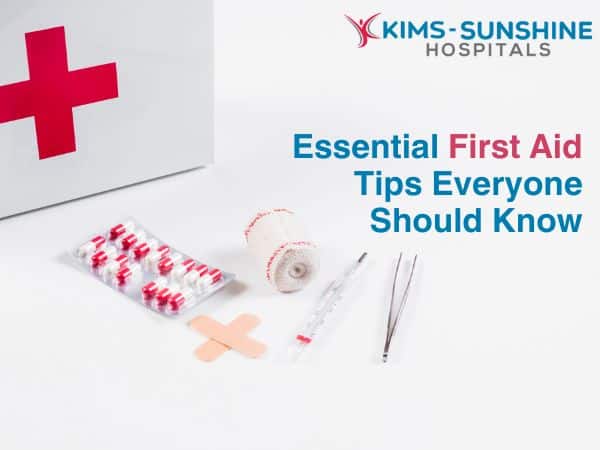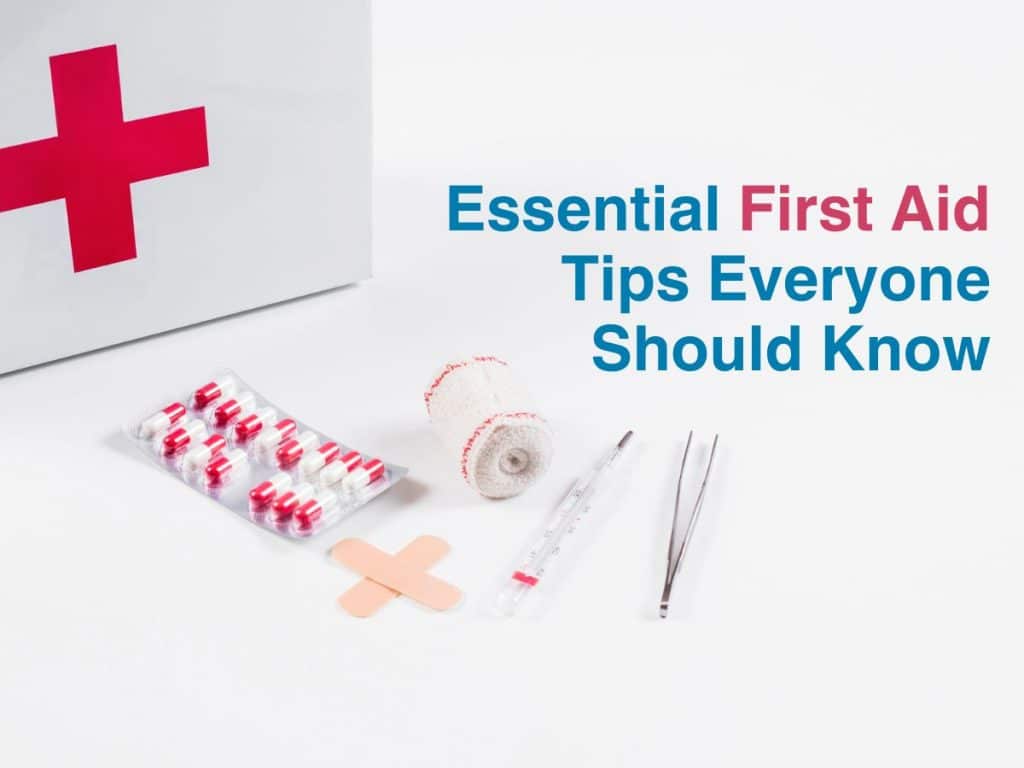
Essential First Aid Tips Everyone Should Know
Introduction
Accidents can happen anywhere and at any time. Being prepared is the only way when it comes to dealing with it. How do you do that? By learning the basics of first-aid beforehand and then applying the requisite approach at the right time to the situation you have at the moment- all while not freaking out and staying calm.
First-Aid Procedures For Everyday Emergencies
Examples of some everyday emergencies include the following – cuts and bleeds, burns and scalding, a sprained limb, diarrhea, any kind of fall or traumatic injury, choking, drowning, food allergies, shocks from electrical sources, or even stroke. The tools for dealing with an emergency must be contained in a labeled and handy first-aid box. While it is not possible for us to go through every possible emergency, we can help you with a few of the ones mentioned above.
Cuts and bleeding – Cleaning the wound first takes precedence. Then gentle pressure is applied to stop bleeding, followed by dressing of the affected area using a sterile gauze or bandage.
Burns – Rush to a sink and run some cool and NOT cold water on the burnt part of the skin for a few minutes. Remember to then dress the wound with some hemostatic gauze or non-cotton bandage so the fibers don’t get stuck to the area. Blisters will form in some time but do NOT pop them. They are protective in function. They will recede in a few days.
Sprained limbs – Just stop moving and rest. Apply ice wrapped in a handkerchief to the sprained area. Go for a tightly bound bandage next if possible, or rush to a doctor. Do not forget to elevate the affected limb.
Diarrhea – Give the person plenty of fluids like water, and tender coconut water, and refrain from offering highly salty or sugary drinks as they can make it worse. Resting is the best solution. Eating gut-friendly foods like fermented rice kanji, curd rice, buttermilk, or bland food is best for some time.
Falls or accidents – This depends on the kind of injury. But try not to move at all and stay put, till someone can assess you completely.
Choking – Try to cough or give abdominal thrusts or back blows to the person affected. You could attempt the Heimlich maneuver but you need to know exactly how it is done, or it could be harmful. For babies or toddlers, repeated back blows while holding them at a tilted angle facing downwards should work.
Drowning/Cardiac events – CPR (CardioPulmonary Resuscitation) needs to be done ASAP. It means performing repeated and quick chest compressions (100-120 beats per minute rate) while also providing an artificial means of ventilation (keeping their airway open). The goal is to keep the heart pumping so the brain can be saved soon.
Anaphylactic shock from food allergens – Food allergies are no joke and can be minor or fatal. The reaction to the food item may occur in a few minutes to after a few hours. It needs to be done immediately or the person may go into shock, stop breathing due to an inflamed airway or the heart may get too stressed. An epinephrine auto injection will help, or someone else could do it for you. Keep the EpiPen handy.
Electrical shocks – Remember to assess if the voltage was high or low. Do NOT touch them if they are still in contact with the electrical source. Symptoms may include severe burns on the body, haphazard breathing, irregular heart rate, pain, seizures or fainting. Begin CPR if the person is not moving or breathing and continue to give compressions till emergency services arrive, or the person regains consciousness or movement- whichever is first. Cover the affected area with sterile non-fibrous dressing.
Stroke – If you notice someone having trouble speaking or smiling, dizziness or severe confusion then they may have just suffered a stroke. The first hour, which is the golden hour, is crucial. Get them to a hospital within an hour. Meanwhile, you could lay them on their side and give them a pillow. Cover them with a blanket if they feel cold. Remove all tight clothing articles like buttons or scarves.do NOT move them after this and wait for help.
Importance of First Aid Knowledge
It is always better to be prepared for the worst and this is the very basis of first-aid administration. As soon as you realize someone is in trouble, you need to stop overthinking, calm down, find the reason and immediately assess the extent of damage caused. Next is to clear the airway or check for pain from an injury or sprain. Finally you need to make the right decision – give CPR, call emergency services, remove restricting clothing, lay them down, restrict movement, etc. Having some basic first-aid knowledge will help you save a life, prevent any condition from getting worse, and improve safety in general. The critical know-how can also make you confident about dealing with dire situations in a calculative manner.
Conclusion
Most of us go through life expecting other people to help when something unexpected happens to us. But when you know the basics of first-aid, you are essentially someone who can handle emergencies, and ensure that an event is not fatal for an individual. So, stop saying that you are too busy to want to learn about CPR, that you know too much or that it is unnecessary. First-aid saves lives.
Frequently Asked Questions

Dr. Javvaji VenuGopal Rao
MBBS, MEM
HOD Consultant Emergency Medicine







